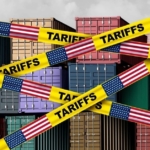
Physical music formats such as vinyl records, CDs and cassettes are exempt from the new US tariffs that took effect on Friday, August 29, United States Customs and Border Protection confirmed.
The agency said these items qualify as “information materials” and are therefore excluded from the trade restrictions, providing relief to record collectors, independent sellers and music retailers.
The exemption comes as part of wider changes to the so called ‘de minimis’ rule, which previously allowed low value packages to enter the United States duty free.
Under the old standard, packages valued at $800 or less were not subject to taxes or tariffs.
That threshold was raised from $200 to $800 by Congress in 2016, and critics said the higher limit had become a conduit for illicit shipments.
Customs says ‘de minimis’ shipments ballooned to 1.36 billion packages in 2024, up from 134 million in 2015.
The agency added that last year these shipments accounted for 98 percent of narcotics seizures by case count, 97 percent of counterfeit goods seized, and 77 percent of health and safety related seizures.
In July, President Donald Trump signed an executive order suspending duty free treatment for de minimis shipments, and the new rules took effect at the end of August.
Still, Customs clarifies that physical music media fall under 50 U.S.C. section 1702(b), which exempts certain donations and informational materials from trade restrictions.
The United States Harmonized Tariff Schedule also lists “phonograph records, tapes, compact disks, CD ROMs” among the categories considered informational materials.
Industry platforms reacted quickly. Discogs said, “Simply put, music and informational media have always been exempt from tariffs and continue to be so at this time.

This means neither sellers nor collectors on Discogs should be charged additional customs fees.” The marketplace warned, however, that implementation may vary, and it advised sellers to describe items precisely on customs forms.
Discogs suggested using descriptions such as Informational Materials: phonograph (vinyl) record rather than simply saying vinyl.
Bandcamp issued guidance of its own. Because the platform sells both music and non-music merchandise, it added features that let sellers limit or block shipping to the United States to avoid customs headaches.
Both Bandcamp and Discogs urged sellers to use the correct Harmonized System codes when completing paperwork.
Not all consequences of the tariff changes are neutral.
CNBC reported that trade lawyer Marianne Rowden estimates the added costs to small and medium sized businesses could exceed $71 billion.
Several international postal services and couriers have already paused certain shipments bound for the US, including Swiss Post, Japan Post, Australia Post, India Post, New Zealand Post, Royal Mail in the UK, and DHL operations in Germany.
Andrew Williams, CEO for DHL Express Americas, told CNBC, “For shippers, this brings increased costs, complexity, and the need to adapt shipping setups to comply with new customs requirements.
They may also face longer processing times and additional administrative steps when importing lower value goods.”
The timing of the waiver for physical music is critical for the recorded music market. Vinyl remains the dominant physical format.
According to the Recording Industry Association of America, vinyl sales rose for an 18th consecutive year in 2024, generating $1.4 billion and accounting for nearly three quarters of physical music revenue.
Vinyl unit sales outpaced CDs for the third year in a row, with 44 million vinyl albums sold versus 33 million CDs, while total physical revenues hit $2 billion.
The legal landscape is shifting too. On Friday, the United States Court of Appeals for the Federal Circuit ruled against the administration’s earlier emergency tariff declarations.
President Trump reacted on Truth Social, writing, “Today a Highly Partisan Appeals Court incorrectly said that our Tariffs should be removed, but they know the United States of America will win in the end.
If these Tariffs ever went away, it would be a total disaster for the Country. It would make us financially weak, and we have to be strong.”
Market analysts observed that the impact on streaming and digital music will likely be limited.
TD Cowen said digital goods are unaffected by the tariffs, and that subscription streaming revenues at major labels and platforms would probably not see major disruption even if consumer spending softens.
For collectors and indie sellers the bottom line is cautious relief. Music Business Worldwide reported that physical music formats retain protection as informational materials, but it also noted continued uncertainty about how customs and carriers will apply the rules in practice.
Sellers are being urged to label shipments carefully, preserve clear product descriptions, and stay alert to carrier updates as the new de minimis regime rolls out.